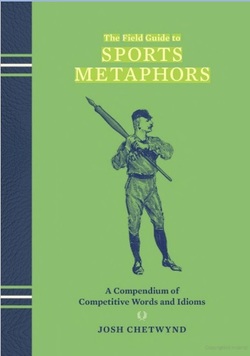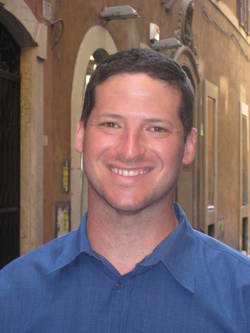
The clandestine deals that led to the shutdown were considered dirty pool and below the belt by now-former employees. They were hoping to be saved by the bell, but instead were floored by the power play that took place. Some were even bowled over.
You get the idea. Seven sports metaphors in two paragraphs. These catchy phrases are used in business, personal relationships and family matters. Thanks to author Josh Chetwynd, these bits of sports wisdom have been collected in a handy little reference guide that will evoke smiles, laughter and wonderment — as in, “I didn’t know that.” “The Field Guide to Sports Metaphors: A Compendium of Competitive Words and Idioms” (Ten Speed Press; hardback; $15; 216 pages) is a fun, fast read.
This is Chetwynd’s sixth book. Others include “How the Hot Dog Found its Bun” and “The Secret History of Balls.” He also has written for USA Today, the Hollywood Reporter and U.S. News & World Report, and has done baseball broadcasts in the United Kingdom for the BBC. He served as the BBC’s color analyst for the World Series five times between 2003 and 2012. He played collegiately at Northwestern, where he was the Wildcats’ catcher, and at age 21 got into three games professionally in 1993 with the Zanesville Greys of the Frontier League, making two plate appearances (a walk and a sacrifice, meaning he had no-official at-bats). You might say he was in the minors for a cup of coffee (a sports metaphor in its own right, but not a universal one …).

There are some interesting bits that Chetwynd has uncovered. For example, he credits Manute Bol with the now-universally accepted phrase, “my bad.” The 7-foot-7, former Dinka tribesman, would use the phrase — instead of “my fault” — when he made a mistake. Chetwynd also traces the history of the word “flake,” contending that it “officially” was applied to former major-leaguer Jackie Brandt. During an 11-year career with four major-league teams, Brandt — who turned 82 last month — had been known to slide into every base after hitting a home run, or run the bases backward, a la Jimmy Piersall. Caught in a rundown, Brandt attempted a back flip to avoid the tag.
According to The Baltimore Sun, Brandt struck out looking on a 3-2 pitch with the bases loaded to end a game. When manager Paul Richards asked whether he was looking for a fastball or curve, Brandt said “neither.”
“I was guessing ball,” as in ball four, he told Richards.
I suppose Brandt was a flake, but the first one? Hard to say. There was Germany Schaefer, an infielder who played in the majors from 1901 to 1918. Schaefer once stole second base, then retraced his steps and “stole” first on the next pitch — only to resteal second again. Or Lefty Gomez, the Yankees pitcher who stepped off the pitching rubber to watch a plane fly overhead during Game 2 of the 1936 World Series.
Horse racing and boxing seem to have some metaphors that have really resonated with the public. Winning by a nose, neck and neck, the home stretch — all are from horse racing. Boxing terms, in addition to the phrases used earlier, added terms like heavyweight, in your corner, knockout, on the ropes and second wind.
Even wrestling gets a chapter, although I was disappointed that none of commentator Gordon Solie’s pat phrases — pier-sixers, his face is a crimson mask, we’ve got to get order restored — made the cut. But crying uncle and no holds barred are just as good.
Pro football gave us “Monday morning quarterbacks,” “running interference” and “time-out.” Auto racing contributed “pit stop” and “pedal to the metal,” while billiards added “behind the eight ball” and “running the table.”
Chetwynd also traces the history of the word “fluke,” which surprisingly was a billiards term.
The book has a nice section of notes, and there is even a “free-agent” section of the book that takes in phrases that are not necessarily limited to one sport.
As we approach the finish line, it’s worth noting that “The Field Guide to Sports Metaphors” is a fine literary companion — hands down.
 RSS Feed
RSS Feed
